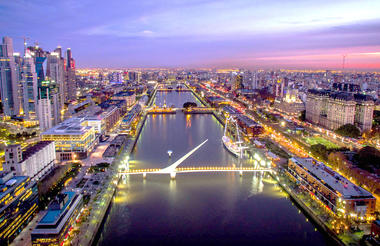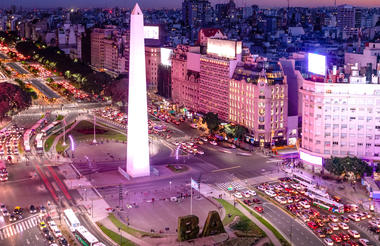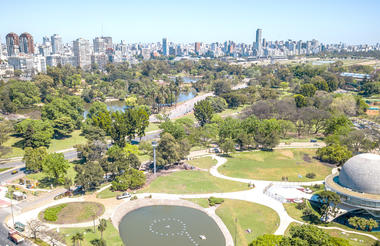Situated on Argentina’s stunning Rio de la Plata coast, Buenos Aires is a thriving portside capital defined by a rich history, vibrant culture, and strong European influence - thus nicknamed the Paris of South America. Countless museums covering a cornucopia of subjects; an active theatre culture; carnivorous buffets second to none; sensuous tango performances; a mosaic of architecture; and shops to fit all fancies – all these facets and more make up the seductive blend that is Buenos Aires. Some of the city’s highlights include the buzz of the La Bombonera Stadium; tango and milonga venues like the Bohemian La Catedral; and heritage architecture such as that at the Cementerio de la Recoleta, where visitors can wander through a ‘city’ of massive statues and marble mausoleums. Don’t miss the International Festival of Independent Cinema and the vibrant annual Pride Parade.



Resting at the confluence of the Parana and Iguazu rivers, Puerto Iguazu is a charming tourist city that serves as the gateway to Iguazu Falls on the Argentinian side of the border. It is surrounded by red rocky landscape interspersed with verdant forest inhabited by abundant wildlife. The city is a popular tourist destination and draws visitors from around the globe to visit the Iguazu National Park and its breathtaking waterfalls. Visitors can also explore the spectacularly scenic surroundings through a variety of activities including: jumping on one of the many tours on offer, enjoying an array of outdoor activities, visiting the Guira Oga - 'The House of Birds', and soaking up the views from the Hito de las Tres Fronteras, a magnificent natural park.



Situated in the Misiones Province of Argentina, in the beautiful Iguazu Department, the Iguaza National Park is a phenomenal wonderland of natural beauty and ecological importance. At the centre of the Paranaense Rainforest, the majestic Iguazu Falls tumble in a display of 275 cascades, and constitute one of the largest waterfalls in the world, earning it a classification as one of the ‘New Seven Wonders of Nature’. The entire park has been recognised as a UNESCO site, due to the falls as well as its abundance of important (and often endangered) flora and fauna. Look out for colourful butterflies, numerous wild cat species, and rare, threatened animals such as the jaguar, yacare caiman, and tapir. Thrill-seekers can take part in white river rafting, while those seeking more leisurely pursuits can take in the views from the park’s excellent restaurant.



Foz do Iguacu is an important Brazilian town within the state of Parana, set close to the three-way border between Brazil, Argentina and Paraguay. Explore the incredible natural wonders of the UNESCO-listed Iguazu National Park, which offers the chance to see not only the enormous cascading waterfalls (one of the largest in the world) but also numerous rare and endangered plants and animals. At the Bird Park, see bright and beautiful winged species. Marvel at the architecture, atmosphere and sacred ceremonies at the Buddhist Temple and Omar Ibn Al-Khattab Mosque. Delve into local heritage by attending the mesmerising Ipora Show, a celebration of culture through story, song and dance. Other highlights include the Three Borders Landmark, Itaipu Dam, and Dreamland Wax Museum.



An enticing mix of historical architecture, picturesque views and sprawling vineyards await travellers to Salta, located in the lovely Lerma Valley in the Andean foothills. Simply wandering through the streets of the central city area will take you past a variety of impressive 18th and 19th-century buildings, including the neoclassical Cathedral of Salta, the ornate Church of Saint Francis and the Museum of High Mountain Archaeology – housing a collection of ancient Inca relics. Other popular attractions are the area’s array of exceptional wineries, and the panoramic views over the region visitors from the top of San Bernado Hill.



The ochre cliffs of the Cerro de los Siete Colores (The Hill of Seven Colours) form a magical backdrop to this charming rural village. The colourful layers have been formed over 600 million years by the accumulated deposits of sea, lake and river sediments. The unmistakeable image of the village against these multi-hued mountains can be found on postcards across the country. Every day there is a vibrant market in the central square, where locals and tourists can purchase clay pots, woven goods and handicrafts. Don’t miss a visit to the village church, Iglesia de Santa Rosa de Lima, which was declared a national monument in 1941.



The small mining town of San Antonio de los Cobres is located in the Andean puna (highlands) province of Salta in northwest Argentina. Though it is home to some charming adobe (mud brick) buildings, San Antonio de Los Cobres is a curious destination in that its chief attraction lies in the rail trip it requires to access the town. The Tren a las Nubes (‘Train to the Clouds’) is the third-highest railway line in the world and is one of the provinces of Salta’s most unforgettable travel experiences. These day trips offer spectacular Andean scenery, and an exciting ride as the train passes over 29 bridges and through 21 tunnels from the city of Salta to the La Polvorilla Viaduct.



Encompassing the provinces of Catamarca, Jujuy, La Rioja, Salta, Santiago del Estero and Tucumán, Northwest Argentina covers some impressive landscapes. The region’s awe-inspiring scenery is characterised by fertile valleys, majestic Andean mountains, tropical jungles, red-rock canyons and mountain passes. Visitors can look forward to driving through the unrivalled beauty of Quebrada de las Conchas, exploring the quaint colonial towns and discovering an array of popular destinations, including the majestic Quebrada de Humahuaca Valley. Other highlights include the wine-producing Cafayate Calchaquí Valley, the mountain town of Tafí del Valle, as well as many vibrant cities.



As previously described



Located in northern Argentina and flanking the Rio Grande River, the UNESCO-listed Quebrada de Humahuaca is a narrow mountain valley known for its mesmerising rock formations and its indigenous Quechuan villages. The Hill of the Seven Colours (Cerro de los Siete Colores) is a rainbow masterpiece, while the limestone formation called Serrania de Hornocal presents a sculpture of triangular-shaped striped rockfaces. The desert valley holds evidence of life dating back 10, 000 years, from early hunter-gatherer tribes to pre-Hispanic communities, Incan culture, Spanish colonizers, and into the 20th century. The villages of Quebradea are filled with ancestral roots, as the indigenous peoples of the area still practise the same rites, festivals, art, music and agricultural techniques as they did hundreds of years ago, making this a unique place to experience traditional culture firsthand.



Resting in the picturesque of Quebrada de Humahuaca valley, the enchanting town of Tilcara is set in the Jujuy Province in northern Argentina. It is known for its rich traditions, scenic landscapes and delicious cuisine. Explore the steep streets lined with earth-and-straw brick buildings, or visit the pre-Hispanic Pucara Ruins, the Sculptures Museum, and a fascinating Carnival Museum. Other activities in and around the city include caravanning with lamas, visiting the local botanical gardens, and meandering along the Garganta del Diablo, an imposing waterfall in the Huasamayo River. Don’t miss a visit to the Dr Eduardo Casanova Archaeological Museum and the incredible Jose. A. Terry Museum to see superb paintings of local life.



Resting in the foothills of Argentina’s Andes Mountain Range, Mendoza has a rich gastronomic heritage, and produces some of Argentina’s most exceptional wines and olive oil. Gourmands can participate in tours and tastings at the many wineries and sample delicious local cuisine at the laid-back cafes. The city also boasts a number of historic attractions, most notably the Museo Fundacional which displays the town’s progress through human evolution, and the Museo Historico General San Martin which honours Jose de San Martin, the general who liberated Argentina from the Spanish. Other highlights include: charming, well-kept parks; bustling, fountain-adorned plazas; and the opportunity for picturesque hiking, skiing and rafting in the nearby Andes. Several exquisite churches and art-deco architecture add to the town’s landscape.



The name Mendoza is synonymous with wine. Surrounded by breathtakingly beautiful Andean scenery, the Mendoza Wine Region is known for its vast vineyards, a wide variety of exceptional wines, and spectacularly majestic scenery. The landscape features desert terrain and mountain vistas interspersed with lush Visitors can look forward to sampling the regions vast selection of world-famous, award-winning vintages including a variety of malbecs at an endless array of fantastic wineries. Other popular activities include: white-water rafting, rock-climbing, skiing, horse riding and other adventures in the nearby Andes. Don’t miss the opportunity to hike several magnificent peaks on the Cordon del Plata reaching over 6000 metres above sea level and take on the highest peak in the Americas, Mt Aconcagua.



Resting in the foothills of the Andes in western Argentina, Potrerillos is a district of the Luján de Cuyo Department in the province of Mendoza. The district features some exceptional natural scenery and serves as a popular eco-tourism destination with a range of outdoor activities on offer including canoeing, hiking, fishing, white-water rafting, windsurfing, kayaking, and camping. The lovely Mendoza River meanders past the eastern edge of the town of Potrerillos and discharges into the exquisite trout-filled Potrerillos Dam. The banks of this dam and river are fringed by an array of cabins and inns, providing a peaceful retreat away from the city of Mendoza which lies only 60 km to the south. Must-see sights of the surrounding area include: the small but charming Vallecitos ski resort and the healing hot spring waters of Cacheuta.



Uspallata is an Andean settlement located in Argentina's Mendoza Province, close to the Chilean border. The town is set at an altitude of 6,690 feet above sea level and surrounded by desert mountains and a petrified forest. Places of interest in Uspallata include the ruins of the Paramillos Mines, the 17th-century kilns which are shaped like eggs and a small museum.











